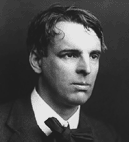 |
W.B. Yeats( 13 June 1865 – 28 January 1939) was an Irish poet and one of the foremost figures of 20th century literature. In 1923 he was awarded the Nobel Prize in Literature for what the Nobel Committee described as “inspired poetry, which in a highly artistic form gives expression to the spirit of a whole nation.” |
“The world is full of magic things, patiently waiting for our senses to grow sharper.”
– W.B. Yeats
William Butler Yeats was born in Dublin, Ireland, in 1865, the son of a well-known Irish painter, John Butler Yeats. He spent his childhood in County Sligo, where his parents were raised, and in London. He returned to Dublin at the age of fifteen to continue his education and study painting, but quickly discovered he preferred poetry. Born into the Anglo-Irish landowning class, Yeats became involved with the Celtic Revival, a movement against the cultural influences of English rule in Ireland during the Victorian period, which sought to promote the spirit of Ireland’s native heritage. Though Yeats never learned Gaelic himself, his writing at the turn of the century drew extensively from sources in Irish mythology and folklore. Also a potent influence on his poetry was the Irish revolutionary Maud Gonne, whom he met in 1889, a woman equally famous for her passionate nationalist politics and her beauty. Though she married another man in 1903 and grew apart from Yeats (and Yeats himself was eventually married to another woman, Georgie Hyde Lees), she remained a powerful figure in his poetry.
Yeats was deeply involved in politics in Ireland, and in the twenties, despite Irish independence from England, his verse reflected a pessimism about the political situation in his country and the rest of Europe, paralleling the increasing conservativism of his American counterparts in London, T. S. Eliot and Ezra Pound. His work after 1910 was strongly influenced by Pound, becoming more modern in its concision and imagery, but Yeats never abandoned his strict adherence to traditional verse forms. He had a life-long interest in mysticism and the occult, which was off-putting to some readers, but he remained uninhibited in advancing his idiosyncratic philosophy, and his poetry continued to grow stronger as he grew older. Elected a senator of the Irish Free Republic in 1922, he is remembered as an important cultural leader, as a major playwright (he was one of the founders of the famous Abbey Theatre in Dublin), and as one of the very greatest poets in any language of the century. W. B. Yeats was awarded the Nobel Prize in 1923 and died in 1939 at the age of 73.
Source: Poets.org
Poems from W.B.Yeats
- Against Unworthy Praise
- An Irish Airman Foresees his Death
- Cloths of Heaven
- Easter 1916
- Hearts with one purpose alone
- High Talk
- Leda and the Swan
- Memory
- Presences
- Sailing to Byzantium
- That woman’s days were spent
- The Collar-Bone of a Hare
- The Lake Isle of Innisfree
- The Second Coming
- The Wild Swans at Coole
- The Winding Stair
- Two Songs of a Fool
Books on W.B.Yeats from
Amazon.com
Other Links
